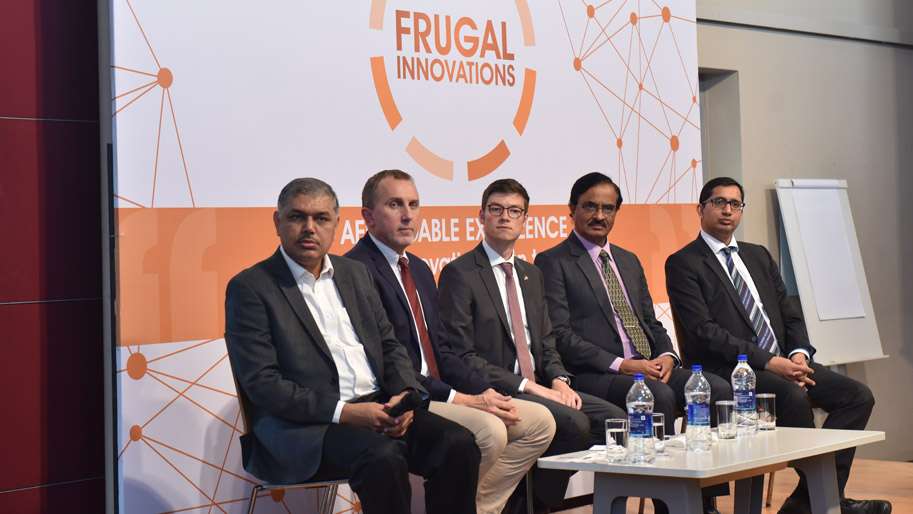DWIH Frugal Innovations Event Series 2017
 © DWIH New Delhi
© DWIH New Delhi
“Affordable Excellence” How frugal innovations can turn into an engine for growth in India and abroad
Innovation and leadership advisor Navi Radjou explains frugal innovation as the product of human creativity; wherein this natural and infinite renewable resource comes up with “smart, cheap solutions to people’s biggest problems.” Hence, realizing the value of understanding the relevance of frugal innovation in today’s day and time, the German House for Research and Innovation (DWIH New Delhi) conducted its first ever ‘Frugal Innovations Seminar’ in association with the Hamburg University of Technology (TUHH). Hosted at the German Embassy, New Delhi on 28th November 2017, this event was attended by start-ups, R&D Departments of established companies, young innovators and aspiring researchers.
Addressing the crowd with his words of wisdom, the event began with a captivating welcome speech by Deputy Chief of Mission, German Embassy, New Delhi – Dr Jasper Wieck, which set the stage for the rest of the sessions. According to him, “India over the years has become a hub for technology, research and innovation; particularly now with the make in India campaign of the current Prime Minister Narendra Modi.” Additionally, not only the future but also appreciating the country’s glorious past, Dr Wieck cited the example of India’s innovation of “zero” – which although simple but yet gave way to a whole new numeric system.
Following this, emphasizing on the basics of frugal Innovations and their relevance to the global competitiveness of companies, Dr. Rajnish Tiwari of CFI-TUHH, Hamburg took over the first session of the day. According to him, frugal Innovation is about creating attractive value preposition by curbing functionalities and minimizing material and financial resources thus reducing the cost of ownership. Also, irrespective of having different backgrounds, frugal innovation products have common characteristics such as being economical and robust and can be used without much know-how. Moreover, the need to have more of such innovations arises from a pressing need for affordable products; particularly in a country like India where there is a shift in a way that the medium segment market is growing more than ever before. This trend further calls for bigger companies to focus on the fact that customers might not always demand the most technologically complex product but rather something more simple yet sustainable.
Beyond this, drawing a clear distinction between Jugaad and frugal innovation, Dr Tiwari defined the former as only a cheap make-shift solution to a problem which possibly does not even get considered once the purchasing power of a customer increases. However, frugality on the other hand as mentioned by him is not about variety but rather the best appropriate solution to any issue/situation/need.
Further, adding to the concept of Jugaad, Prof. Aravind Chinchure of Symbiosis International University, Pune pointed safety as the main differentiator between frugal innovation and Jugaad, where the later lacks the same. Subsequently, he also stressed on reasons behind the emergence of frugal innovation such as “sustainability, emerging markets, global economic pressure, the existence of a globalized and hyper connected digital world, disruption of businesses and industries and the rise of a middle class segment with higher aspirations” and vehemently stated this concept as an enabler of “access equality in a world of economic inequality.”
Moving on to the need of frugality in the field of medicine, Dr. Shyam Vasudeva Rao, Founder – Director Forus Health Pvt Ltd, RenalyX health care systems, Rx Digi Health Platforms and E Health Enablers Pvt. Ltd claimed that the primary benefit of frugal innovation in medicine lies in the fact that it reduces waiting time thus eliminating the chances of prolonged medical examinations hindering with the earnings of daily wage earners. Besides this, it also cuts-down on the number of people visiting hospitals by making it possible to place technologies in the hands of health workers who further reach out to the masses at the grass root level.
Last but not the least to share his views on the theory of frugal innovation was Dr. Stephan Buse of CFI-TUHH, Hamburg who quoted that “frugal Innovation needs to be of good quality, should have great performance and also be price sensitive.” Also, the word “frugal” sometimes has a negative connotation and thought off on the likes of Jugaad, which is why it is often replaced with the phrase ‘Affordable Excellence’ as added by Dr Buse. Furthermore, he revealed that extensive research on market-dynamics acts as a pre-requisite to launching any frugal innovation product whereas in a developing country like India, companies should try innovating bottom-up while also considering frugal solutions to already established theories. For example, adding new functionalities is a part of the innovation strategy of any company, however, what essentially matters is how all of it can be used appropriately as functionality is a consequence of need.
Thus, this event addressed all the dimensions of the concept of frugal innovation and threw light on its relevance and need in the present day scenario. This also could be clearly observed from the questions that come up from the audience during the panel discussion that followed the sessions and raised concerns over the issues of frugal product marketing, commonality between frugal and disruptive innovation, environmental impacts of such innovations etc.
Understanding the demand for knowing more about fugal innovations or rather affordable excellence, the German House for Research and Innovation also hosted a Science Circle Lecture by Dr Rajnish Tiwari and Dr Stefan Buse on 29th November 2017 on the same topic. Organized at the German House, this lecture was open to the public and saw a full house with many well informed members from the audience asking intriguing and interesting questions during the Q&A session post the lecture.
Date: Tuesday, November 28, 2017 to Wednesday, November 29, 2017
Venue: German Embassy and German House
